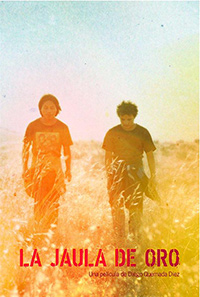Trains of Innocence: Savage Road Story to the Land of Broken Dreams
 Among the vast and redundant collection of tales dealing with illegal immigration, very few can claim to be unique. Given that there are some inherent qualities to these stories, it takes an assertive new voice to infuse the subject matter with honesty. Spanish director Diego Quemada-Díez’ La Jaula de Oro, which translates to “The Golden Cage”, is perhaps the most poetic, and neo-realist film about the struggles of people searching for a better future thousands of miles away from home, and at any cost.
Among the vast and redundant collection of tales dealing with illegal immigration, very few can claim to be unique. Given that there are some inherent qualities to these stories, it takes an assertive new voice to infuse the subject matter with honesty. Spanish director Diego Quemada-Díez’ La Jaula de Oro, which translates to “The Golden Cage”, is perhaps the most poetic, and neo-realist film about the struggles of people searching for a better future thousands of miles away from home, and at any cost.
Trying to disguise her feminine qualities, Sara (Karen Martínez) cuts her hair binds her breasts, as she gets ready to depart from her native Guatemala with her boyfriend Juan (Brandon López) and their friend Samuel (Carlos Chajon). The trio of kids, all of them no older than 16, head out determined to make it to the United States. With no visible adult influence in their lives, they have no choice than to go north. However, the road is plagued with dangers, as the illegal mobilization of people across the Mexican territory has become a very lucrative business for criminals of all trades. Early in their journey the group s joined by a native (probably Mayan) boy named Chauk (Rodolfo Domínguez) who only speaks his indigenous language. Sara develops an unlikely Tarzan-and-Jane-like friendship with him, which doesn’t sit well with jealous Juan and ends up getting deported back very quickly.
Relentless they take another stab at it, this time around Samuel decides to stay back, and, despite Juan’s efforts to get rid of him Chauk continues on the road with them. On the vein of films like Sin Nombre or the more recent The Precocious & Brief Life of Sabina Rivas, their experience includes traveling on the roof numerous trains, being robbed and abused by bands of cartel-related villains and thugs. Nonetheless, this Cannes-worthy film separates itself from the rest by virtue of his evocative imagery and dual honesty. Yes, Quemada-Díez presents the multiple atrocities that occur to people hoping to fulfill their version of American dream by any means necessary, but he also strategically shows the less prominent, but after all real, people who empathize with these travelers such as church members who give them food, or random farmers who at the very least throw oranges at them as a kind gesture of encouragement.
Not only does the director creates a complex universe in which these kids must strive to survive while at the same forging their friendships on the basis of their shared predicaments, but he goes as far as to infer about what waits for the ones that make it on the other side. Meat packing factories and lonely nights under a snowy northern landscape to which he allures through the film, that redeeming snow that prevails is more a symbol of never-ending tempest that of hope it seems.
There are twists and turns in the plot that make for a satisfying, often heartbreaking viewing experience. Yet, the greatest achievement of La Jaula de Oro is to get across the little blame or judgment that can be place of these people. Certainly, they do not voluntarily want to run away from their homelands, but when hunger and desperation are the only dishes served every night, even risking it all to enter an oppressing capitalist prison in which they will have to work extensively for no much pay or benefits, is more appealing than sitting down waiting for their circumstances to kill them, and their loved ones. Compelling, torturous, and undoubtedly powerful.
✮✮✮✮ stars


